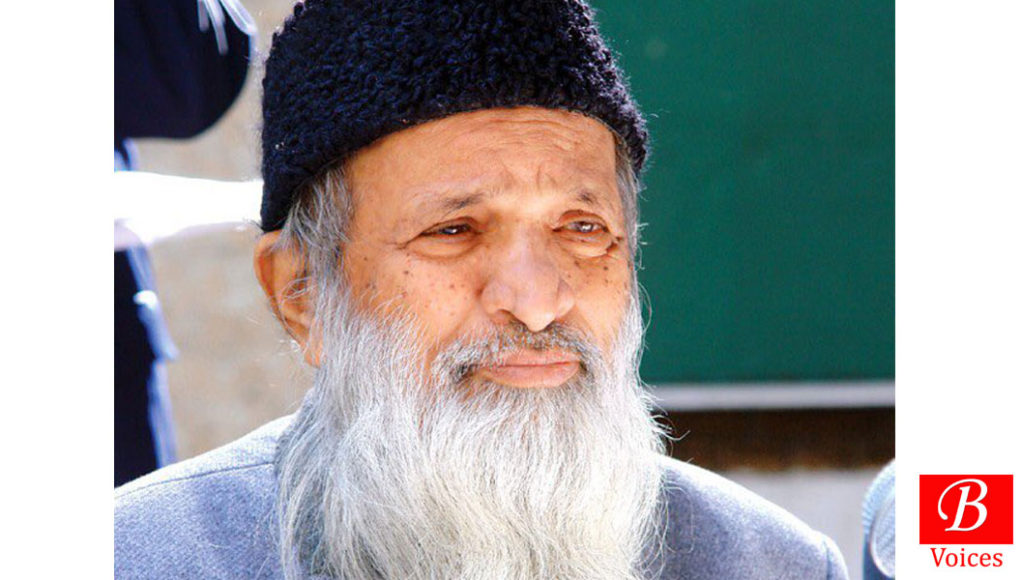Ayaz Khan
Imagine this, flexing muscles before election campaigns, avowing masses to ease their woes, bring them unseen and unfelt relief which disowned masses have awaited since inception and condensing all claims of finishing bothersome issues of electricity, terrorism, injustice, disparity and ‘extremism’ in a political rhetoric, had been the legacy of legendry philanthropist: late Abdul Sattar Edhi, if he were a politician! Edhi, instead of keeping the downtrodden in a hypothetical situation like our politicians do, chose to materialize the claim of serving humanity which politicians and political elite of Pakistan have been unable to deliver.
On the eve of cancer day, though the Chief Minister (CM) Balochistan muzzled the spurting voices, circulating on social media with his eloquent speech while announcing to bring a cancer hospital to home in order to save further loss of life, yet a landmark initiative was also observed with the announcement of his philanthropic effort to lay down the foundation of Sikander Zehri Shaheed Ambulance Trust. The pivotal part of the speech, in fact, was the endorsement of philanthropic work by making the legendry philanthropist Abdul Sattar Edhi an epitome.
Read also: Edhi: Legendary Philanthropist Laid to Rest
Indeed, it was another day for the masses of Balochistan to din their voices for a cancer hospital into the ears of concerned health department vis-a-vis Chief Minister of Balochistan simultaneously while marking the eve of ‘cancer day’. The social media floated with tweets raising the suppressed message of Rehan Rind, an indigenous student of Balochistan, who lost the battle against blood cancer on September 6, 2016.
CM vowed to follow the footprints of Abdul Sattar Edhi to serve humanity, indeed, at least a positive approach since after Edhi’s death! Edhi’s welfare empire is the outcome of a pathetic attitude by the proclaimed saviours. Being an adherent to socialism, Edhi did start his services for the sake disowned humanity but at the core of his services was the struggle to finish inequality at first place and later on he started carrying unclaimed bodies and arranged funeral.
Let’s weigh the long-bearded Edhi’s crocheted ‘shalwar kamiz’ and a pair of slippers with the luxurious life of politicians for a minute or two. Now imagine. Edhi earned the title of ‘the richest poor’ despite being engulfed by the Dollars and Euros with an annual budget of around 9 million dollars—the total cost required for the services of Edhi foundation such as provision of emergency services and for managing affairs of the foundation on daily basis—which he received as charity. On the other hand, 750 million ‘rupees’ and luxurious palaces felt insufficient to push a ‘simple’ life of a politician!
Now, just have a pause and think. If a politician, wielding enormous power, is unable to deliver what Edhi delivered with a meagre living standard, can be a denial of the fact that Edhi did not attempt to retain such a political power? Yes he (Edhi) did. But the reason that led Edhi to try his luck on political fronts was the miseries of people who suffered in the hands maladroit politicians. To follow a fair path, Edhi decided to enter into political arena while joining hands with Mohtarma Fatima Jinnah through Ayub’s basic democracies but preferred to ally himself with Combined Opposition Parties COP instead. In 1982, while replying to the then dictator Zia, when offered a seat in parliament, Edhi replied, “How will the grand people of the assembly suffer the presence of a beggar?”
Being an ardent follower of the concept of ‘building a welfare state from the below’, Edhi’s entrance into politics was an attempt to build a welfare state inversely (top to down). Before putting oneself in the shoes of Edhi, one has to be well acquainted with his life, devotion, perseverance and above all with his denial of worldly wishes.
CM Balochistan’s dedication to Edhi after renaming Hockey Chowk with Edhi Chowk is a quite significant addition to the list of attributions and dedications attached to the name of legendry philanthropist. To jump back to contextualize the speech and initiative of a Trust for easing the sufferings of disowned and poverty-ridden masses, will it be wrong to pose a question about government’s due role in providing rights to citizens which lies at the core of responsibilities of the government at first place and the welfare trusts at the second in case government fails to provide masses with their basic rights?
Writer is journalist associated with Balochistan Voices
Share your comments!








